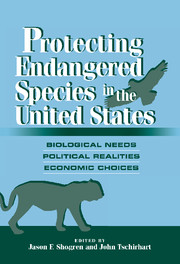 Protecting Endangered Species in the United States
Protecting Endangered Species in the United States Book contents
- Frontmatter
- Contents
- About the Authors
- Acknowledgments
- Foreword
- 1 The Nature of Endangered Species Protection
- PART 1 BIOLOGICAL NEEDS
- PART 2 POLITICAL REALITIES
- PART 3 ECONOMIC CHOICES
- PART 4 SUMMARY AND DATABASE
- 18 Why Economics Matters for Endangered Species Protection and the ESA
- 19 DEMES: Database on the Economics and Management of Endangered Species
- Index
18 - Why Economics Matters for Endangered Species Protection and the ESA
Published online by Cambridge University Press: 06 July 2010
- Frontmatter
- Contents
- About the Authors
- Acknowledgments
- Foreword
- 1 The Nature of Endangered Species Protection
- PART 1 BIOLOGICAL NEEDS
- PART 2 POLITICAL REALITIES
- PART 3 ECONOMIC CHOICES
- PART 4 SUMMARY AND DATABASE
- 18 Why Economics Matters for Endangered Species Protection and the ESA
- 19 DEMES: Database on the Economics and Management of Endangered Species
- Index
Summary
Evidence suggests that Earth's species may be in the midst of a wave of extinction, disappearing at rates 10 to 1,000 times greater than background or natural rates of extinction (Jablonski 1991; May, Lawton, and Stork 1995; National Research Council 1995; Pimm et al. 1995). If we agree that the extinction problem is due to human action, then modifying human behavior must be part of the solution. And yet the consistent exclusion of economic behavior in the calculus of endangered species protection has led to ineffective and, in some instances, counterproductive conservation policy.
This chapter argues that endangered species preservation must take into account basic principles of economic behavior to avoid wasting valuable resources that yield no gain in species protection. We address why economics matters more to species protection than many people think, and what this implies for the ongoing debate over the reauthorization of the ESA (ESA) of 1973.
A news columnist's quip captures a common reaction to reports of species at risk: “What scientists call endangered most people call bait” (Smith 1996). To others the value of protecting endangered species is so obvious, and so overwhelming, that estimates of costs and benefits seem immaterial. This view is exemplified by Roughgarden (1995), who argues that economics should not be confused with morality: “In fact, we should not take costs into account when setting environmental (or other) objectives, but we should take costs into account when considering how to implement moral objectives as policy” [emphasis in original].
- Type
- Chapter
- Information
- Protecting Endangered Species in the United StatesBiological Needs, Political Realities, Economic Choices, pp. 365 - 373Publisher: Cambridge University PressPrint publication year: 2001
- 2
- Cited by
